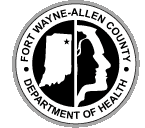
News release from the Fort Wayne-Allen County Department of Health:
Hospitals lift visitor restrictions as flu cases drop
(January 20, 2015) – Effective immediately, Allen County hospitals are lifting visitor restrictions put in place last month to guard against the flu.
For the safety of patients and staff over the last four weeks, the hospitals have been limiting patient visits to two visitors per patient at one time and only visitors who are at least 18 years of age. Flu cases are on the decline and are now at a typical level for this time of year. As a result, the general house-wide restrictions are no longer necessary, although local hospitals will continue to reserve the right to maintain temporary restrictions in some high-risk areas such as NICUs on a case-by-case basis.
“We appreciate everyone’s patience and understanding while these temporary restrictions were in place,” says Dr. Deborah McMahan, Allen County Health Commissioner. “While it was a sacrifice for both patients and hospital staff, we believe these efforts helped to reduce transmission of respiratory illnesses during a period of heightened flu activity.”
While the visitor restrictions have ended, it doesn’t mean residents should drop their guard against flu. Seasonal flu activity will likely continue for several more weeks with the potential for a second wave. So far in the 2014-15 season, eight people in Allen County have died from flu and its complications.
Residents should continue to take the following precautions:
- Get vaccinated. All residents 6 months of age and older should be vaccinated against influenza, pneumonia (if recommended) and pertussis (if recommended) unless there are known allergies to these vaccines. Despite the vaccine not being a good match with the predominant circulating flu strain, health officials continue to advise residents to get vaccinated against the flu, as it offers protection against other circulating strains and is expected to reduce the severity of illness.
- Stay home if you are sick. All residents experiencing fever and muscle aches should stay from school, work, shopping or other social gatherings until they have no fever for 24 hours without the benefit of fever reducing medications.
- Wash your hands frequently. Use soap and warm water whenever possible; if not available, use an alcohol-based hand sanitizer to clean hands.
- Cover your cough and sneeze with a tissue. If you don’t have a tissue, cough or sneeze into your upper sleeve or elbow, not your hands.
- Wear a mask if needed. Patients with cough or fever seeking treatment at a healthcare facility should ask for a mask to wear. Health officials and hospital infection control specialists continue to monitor flu activity in the community.
For more information on flu prevention, go to www.fighttheflu.org.















